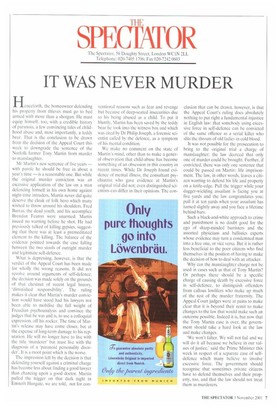IT WAS NEVER MURDER
Henceforth, the homeowner defending his property from thieves must go to bed armed with more than a shotgun. He must equip himself, too, with a credible history of paranoia, a few convincing tales of childhood abuse and, most importantly, a teddy bear. That is the conclusion to be drawn from the decision of the Appeal Court this week to downgrade the sentence of the Norfolk farmer Tony Martin from murder to manslaughter.
Mr Martin's new sentence of five years — with parole he should be free in about a year's time — is a reasonable one. But while the original murder conviction was an excessive application of the law on a man defending himself in his own home against night-time intruders. Martin never did quite deserve the cloak of folk hero which many wished to throw around his shoulders. Fred Barras, the dead youth, and his accomplice Brendan Fearon were unarmed. Martin issued no warning before he shot. He had previously talked of killing gypsies, suggesting that there was at least a premeditated element to the killing. The balance of the evidence pointed towards the case falling between the two stools of outright murder and legitimate self-defence.
What is depressing. however, is that the verdict of the Appeal Court has been made for wholly the wrong reasons. It did not revolve around arguments of self-defence; the decision was made solely on the grounds of that chestnut of recent legal history, 'diminished responsibility'. The ruling makes it clear that Martin's murder conviction would have stood had his lawyers not been able to mobilise the full weight of Freudian psychoanalysis and convince the judges that he was and is, to use a colloquial expression, off his rocker. The time of Martin's release may have come closer, but at the expense of long-term damage to his reputation. He will no longer have to live with the title 'murderer' but must live with the diagnosis of a 'paranoid personality disorder'. It is a moot point which is the worse.
The impression left by the decision is that defending yourself against a criminal charge has become less about finding a good lawyer than chancing upon a good doctor. Martin pulled the trigger on that dark night in Emneth Hungate, we are told, not for con
ventional reasons such as fear and revenge but because of deep-seated insecurities due to his being abused as a child. To put it bluntly, Martin has been saved by the teddy bear he took into the witness box and which was cited by Dr Philip Joseph, a forensic scientist called by the defence, as a symptom of his mental condition.
We make no comment on the state of Martin's mind, other than to make a general observation that child-abuse has become something of an obsession in this country in recent times. While Dr Joseph found evidence of mental illness, the consultant psychiatrist who gave evidence at Martin's original trial did not; even distinguished scientists can differ in their opinions. The con elusion that can be drawn, however, is that the Appeal Court's ruling does absolutely nothing to put right a fundamental injustice in English law: that somebody using excessive force in self-defence can be convicted of the same offence as a serial killer who slits the throats of old ladies in cold blood.
It was not possible for the prosecution to bring to the original trial a charge of manslaughter; the law decreed that only one of murder could be brought. Further, if convicted, there was only one sentence that could be passed on Martin: life imprisonment. The law, in other words, leaves a citizen wanting to defend his life and property on a knife-edge. Pull the trigger while your dagger-wielding assailant is facing you at five yards and the law congratulates you; pull it at ten yards when your assailant has turned slightly away and you face a lifetime behind bars.
Such a black-and-white approach to crime and punishment is no doubt good for the ego of sharp-minded barristers and the assorted physicians and ballistics experts whose evidence may turn a condemned man into a free one, or vice versa. But it is rather less beneficial to the poor citizens who find themselves in the position of having to make the decision of how to deal with an attacker.
Why can the manslaughter charge not be used in cases such as that of Tony Martin? Or perhaps there should be a specific charge of causing death by excessive force in self-defence, to distinguish offenders from callous lowlifers who make up much of the rest of the murder fraternity. The Appeal Court judges were at pains to make clear that it is beyond their remit to make changes to the law that would make such an outcome possible. Indeed it is, but now that the Tony Martin case is over, the government should take a hard look at the law and make changes.
We won't falter. We will not fail and we will do it all because we believe in our values of justice,' said the Prime Minister this week in respect of a separate case of selfdefence which many believe to involve excessive force. The government should recognise that sometimes private citizens have to defend themselves and their property, too, and that the law should not treat them as murderers.


















































































 Previous page
Previous page